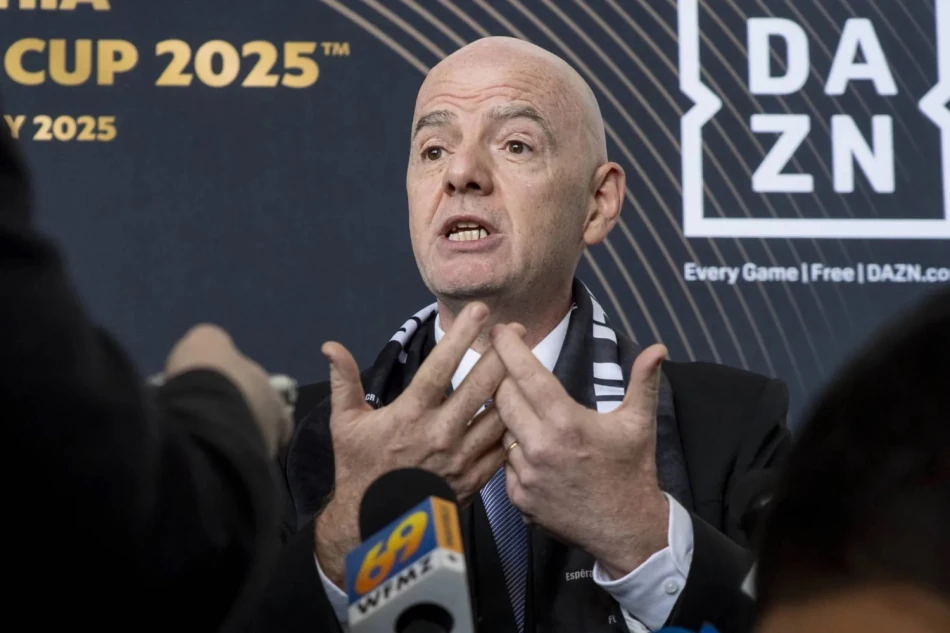
FIFA President Condemns Incidents at German Cup Final
FIFA Chief Condemns Rising Wave of Racist Incidents Across European Football
FIFA President Gianni Infantino has issued a stern condemnation following multiple racist incidents that marred football matches across Germany and England within days of each other, highlighting a troubling resurgence of discriminatory behavior in European stadiums. The incidents, involving Ghanaian players in both the German Cup and English Premier League, have prompted urgent calls for stronger action against racism in football.
German Cup Matches Disrupted by Racial Abuse
Two separate incidents during the first round of the German Cup on Sunday forced authorities to intervene when players faced racist chants from home supporters. The most serious occurred during the match between second-division Schalke and fourth-tier Lokomotiv Leipzig, where Ghanaian winger Christopher Antwi-Adjei was subjected to repeated racist abuse from Schalke supporters.
Match officials were forced to halt play while stadium announcers condemned the racist behavior over the public address system. Despite the intervention, the abuse continued after play resumed, prompting Lokomotiv Leipzig to later issue a formal apology for the treatment their player received.
A second incident emerged from the same round when a Kaiserslautern player alleged he faced racist abuse from supporters of fifth-tier RS Eintracht during their cup tie.
English Premier League Also Hit by Racist Incidents
The German incidents followed closely on the heels of a similar disruption in England's Premier League opener between Liverpool and Bournemouth on Friday. The match was stopped in the 29th minute after Bournemouth's Ghanaian player Antoine Semenyo was targeted with racist chants at Liverpool's Anfield stadium.
English authorities responded swiftly, ejecting the offending supporter from the ground and arresting him the following day. While later released, the individual now faces a comprehensive football banning order, prohibiting attendance at any official football match in the United Kingdom and barring him from approaching within one mile of any football stadium.
FIFA's Response and Broader Implications
Infantino's Monday statement reflected growing frustration within football's governing bodies about the persistence of racist behavior. "It is completely unacceptable that racist abuse occurs in football matches for the second time in recent days," the FIFA president declared, promising continued monitoring of such incidents and enhanced cooperation with national federations.
The FIFA chief's intervention signals the organization's recognition that current anti-racism measures may be insufficient to address what appears to be a coordinated pattern of abuse targeting African players specifically.
A Troubling Pattern Emerges
The targeting of Ghanaian players in both incidents suggests this may not be coincidental abuse but rather part of a broader trend of organized racist behavior in European football. This pattern is particularly concerning given the significant investment major leagues have made in anti-racism campaigns over the past decade.
The incidents also highlight the vulnerability of players from lower-division clubs, where security measures and crowd control may be less robust than in top-tier competitions. The fact that both German incidents occurred during cup matches involving lower-league teams suggests that anti-racism protocols may be inconsistently applied across different levels of competition.
Enforcement Challenges and Future Actions
While English authorities demonstrated swift action with arrests and comprehensive banning orders, the German response appears more measured, relying primarily on stadium announcements and club apologies. This disparity in enforcement approaches may indicate the need for more standardized responses across European football.
FIFA's promise of closer monitoring suggests potential changes to current disciplinary procedures, possibly including more severe penalties for clubs whose supporters engage in racist behavior. The organization has previously imposed stadium closures and point deductions for repeated offenses, but the recent incidents may prompt consideration of even stricter measures.
The concentration of these incidents within a single weekend raises questions about whether current deterrent measures are adequate, and whether football authorities need to fundamentally reassess their approach to combating racism in stadiums across Europe.
Most Viewed News

 Sara Khaled
Sara Khaled






